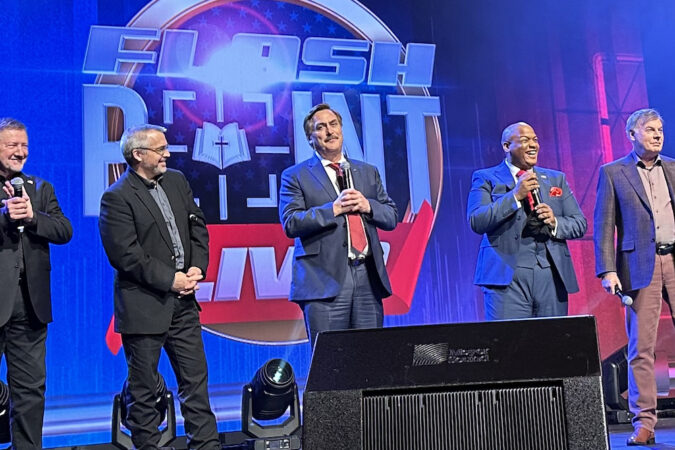
By Jeremy Morrison
MyPillow CEO Mike Lindell — a Trump-era caricature growing even more cartoonish in hindsight — has largely been relegated to the political fringe. Even as a panelist on the current FlashPoint Live tour, a traveling religious-political revival, he appears to have been relegated to comic relief.
“For me, it was always show me more God,” Lindell told a congregation at Brownsville Assembly of God Church, seated among a panel of televangelists, relaying his misadventures on motorcycles, with skydiving and as a crack addict. “I would have these reactionary prayers all the time: ‘God, get me outta this.’ I’d have a gun to my head or something, or something going on — ‘get me outta this, and I promise‘ — I’d be in jail or something.”
But embedded in Lindell’s opening comments was an intensely serious theme that the other panelists — preachers and personalities with Kenneth Copeland Ministries — would expound on Christian nationalism. Though the term “Christian nationalism” was not employed, a classical definition of the philosophy was laid out all the same.
“I was talking to somebody about a divided country — we’re not a divided country,” Lindell said, explaining that he’d solicited feedback from people on the topic during his national travels. “They all want what we all want. We want to bring people to Jesus, we want the American dream, and we want it all, and everybody wants that. This is uniting us, and we will bring God back into our schools, and we will be, once again, one nation under God.”
During the FlashPoint Live event — with also included speaker Gene Bailey, Hank Kunneman and Lance Wallnua, all familiar faces on FlashPoint’s broadcast and internet presence — attendees were invited to learn how to impact change within government so that, as panelist Rick Green put it, the country would see “a rival of the Biblical principals of Jesus Christ in the culture” and “a restoration of constitutional jurisdictions of government and the proper role of government.”
“We’re tired of just the philosophy, it’s time to actually put this to work, so we’re going to put some meat on the bones; we’re actually going to show you how you’re local community politics work, what you can do about your school board, your commissioner’s court, your city council, your state legislature and help us build that farm team,” Green said.
Melissa Deckman, CEO of the Public Religion Research Institute, defines Christian nationalism as the idea that America was founded as a Christian nation and that we should continue to be governed by Christian values and conservative Christian philosophy.” The PRRI released a report this month that indicated support for the philosophy was on the uptick, particularly among conservative Evangelical Christians.
“This report was really an attempt to try to help quantify the extent to which Christian nationalist ideology is adhered to in the American public,” Deckman said, “and to see, essentially, what sorts of things sort of intersect with those viewpoints, in terms of partisanship and race and anti-semitism and patriarchal views and anti-immigrant views, authoritarianism, all those things together, unpacking really what makes up the different criteria of Christian nationalism.”
In summary, the PRRI report determined that more than half of Republicans are sympathetic to the viewpoint that the country should be governed as a Christian nation.
“Clearly, on one side of the political aisle, these ideas, I think, are animating the politics, right?” said Deckman. “So, we find that Republicans are much more likely to be Christian nationalists and white evangelical protestants are more likely to be Christian nationalists than other Americans. And currently, the party base is disproportionately made up of those individuals. That’s where I think the concern is from the perspective of American democracy.”
— For more on the local FlashPoint Live event and the rise of Christian nationalism among conservatives, check out this week’s Inweekly.



